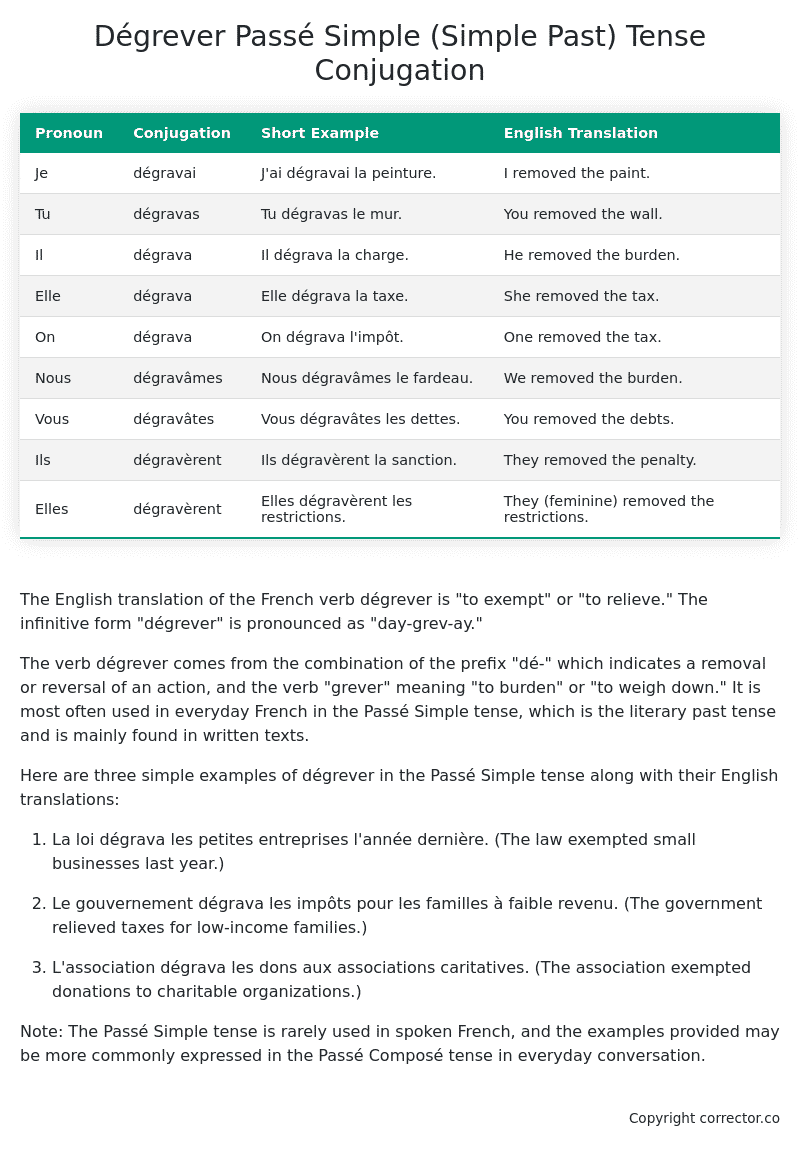Passé Simple (Simple Past) Tense Conjugation of the French Verb dégrever
Introduction to the verb dégrever
The English translation of the French verb dégrever is “to exempt” or “to relieve.” The infinitive form “dégrever” is pronounced as “day-grev-ay.”
The verb dégrever comes from the combination of the prefix “dé-” which indicates a removal or reversal of an action, and the verb “grever” meaning “to burden” or “to weigh down.” It is most often used in everyday French in the Passé Simple tense, which is the literary past tense and is mainly found in written texts.
Here are three simple examples of dégrever in the Passé Simple tense along with their English translations:
-
La loi dégrava les petites entreprises l’année dernière.
(The law exempted small businesses last year.) -
Le gouvernement dégrava les impôts pour les familles à faible revenu.
(The government relieved taxes for low-income families.) -
L’association dégrava les dons aux associations caritatives.
(The association exempted donations to charitable organizations.)
Note: The Passé Simple tense is rarely used in spoken French, and the examples provided may be more commonly expressed in the Passé Composé tense in everyday conversation.
Table of the Passé Simple (Simple Past) Tense Conjugation of dégrever
| Pronoun | Conjugation | Short Example | English Translation |
|---|---|---|---|
| Je | dégravai | J’ai dégravai la peinture. | I removed the paint. |
| Tu | dégravas | Tu dégravas le mur. | You removed the wall. |
| Il | dégrava | Il dégrava la charge. | He removed the burden. |
| Elle | dégrava | Elle dégrava la taxe. | She removed the tax. |
| On | dégrava | On dégrava l’impôt. | One removed the tax. |
| Nous | dégravâmes | Nous dégravâmes le fardeau. | We removed the burden. |
| Vous | dégravâtes | Vous dégravâtes les dettes. | You removed the debts. |
| Ils | dégravèrent | Ils dégravèrent la sanction. | They removed the penalty. |
| Elles | dégravèrent | Elles dégravèrent les restrictions. | They (feminine) removed the restrictions. |
Other Conjugations for Dégrever.
Le Present (Present Tense) Conjugation of the French Verb dégrever
Imparfait (Imperfect) Tense Conjugation of the French Verb dégrever
Passé Simple (Simple Past) Tense Conjugation of the French Verb dégrever (You’re reading it right now!)
Passé Composé (Present Perfect) Tense Conjugation of the French Verb dégrever
Futur Simple (Simple Future) Tense Conjugation of the French Verb dégrever
Futur Proche (Near Future) Tense Conjugation of the French Verb dégrever
Plus-que-parfait (Pluperfect) Tense Conjugation of the French Verb dégrever
Passé Antérieur (Past Anterior) Tense Conjugation of the French Verb dégrever
Futur Antérieur (Future Anterior) Tense Conjugation of the French Verb dégrever
Subjonctif Présent (Subjunctive Present) Tense Conjugation of the French Verb dégrever
Subjonctif Passé (Subjunctive Past) Tense Conjugation of the French Verb dégrever
Subjonctif Imparfait (Subjunctive Imperfect) Tense Conjugation of the French Verb dégrever
Subjonctif Plus-que-parfait (Subjunctive Pluperfect) Tense Conjugation of the French Verb dégrever
Conditionnel Présent (Conditional Present) Tense Conjugation of the French Verb dégrever
Conditionnel Passé (Conditional Past) Tense Conjugation of the French Verb dégrever
Conditionnel Passé II (Conditional Past II) Tense Conjugation of the French Verb dégrever
L’impératif Présent (Imperative Present) Tense Conjugation of the French Verb dégrever
L’impératif Passé (Imperative Past) Tense Conjugation of the French Verb dégrever
L’infinitif Présent (Infinitive Present) Tense Conjugation of the French Verb dégrever
L’infinitif Passé (Infinitive Past) Tense Conjugation of the French Verb dégrever
Le Participe Présent (Present Participle) Tense Conjugation of the French Verb dégrever
Le Participe Passé (Past Participle) Tense Conjugation of the French Verb dégrever
Struggling with French verbs or the language in general? Why not use our free French Grammar Checker – no registration required!
Get a FREE Download Study Sheet of this Conjugation 🔥
Simply right click the image below, click “save image” and get your free reference for the dégrever Passé Simple tense conjugation!

Dégrever – About the French Passé Simple (Simple Past) Tense
Formation
Usage
Narration
Historical Context
Interactions with other tenses
Passé Composé
Imparfait
Conditional and Subjunctive
Summary
I hope you enjoyed this article on the verb dégrever. Still in a learning mood? Check out another TOTALLY random French verb conjugation!


